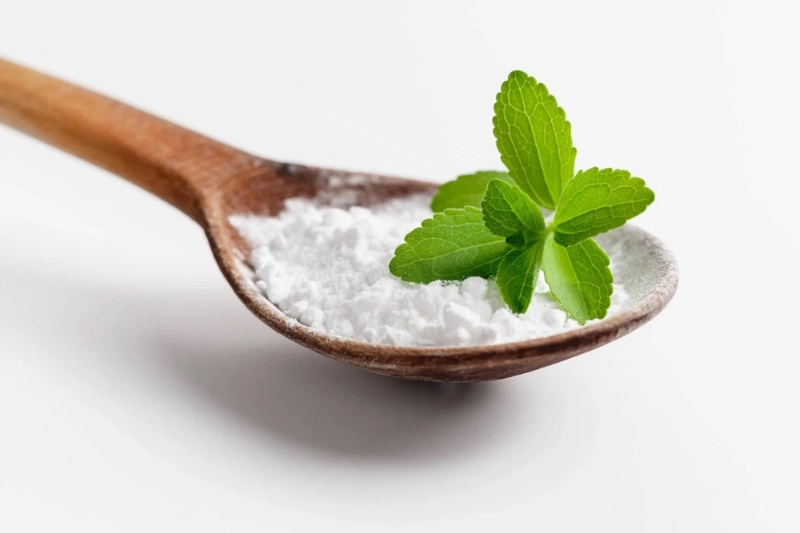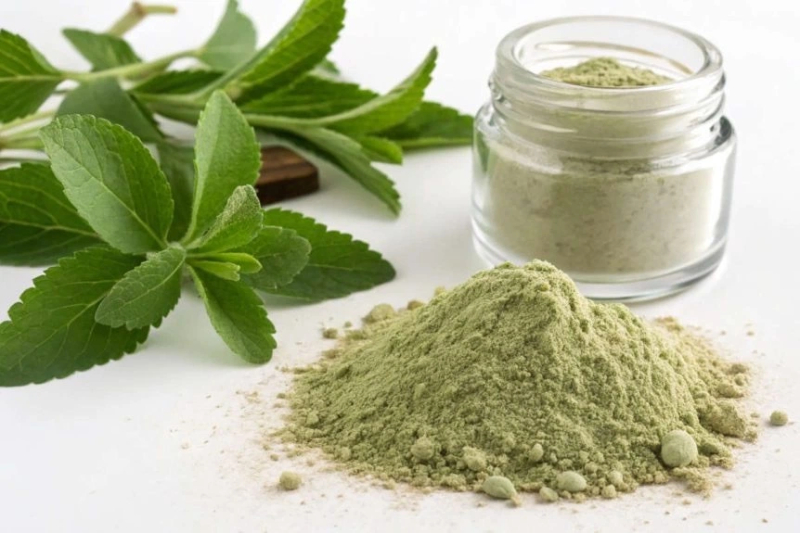







Content Menu
● How Does Stevia Compare to Sugar?
● The Health Benefits of Stevia
>> Supports Diabetes Management
>> Improves Cholesterol Profiles
>> Anti-Inflammatory and Antioxidant Properties
>> Potential Anticancer Effects
● Potential Drawbacks and Considerations
● Using Stevia in Food and Beverage Applications
● Additional Emerging Benefits
>> 1. Is Stevia better than sugar for diabetics?
>> 2. Does Stevia contain any calories?
>> 3. Can Stevia help with weight loss?
>> 4. Are there any side effects of consuming Stevia?
>> 5. Can I cook or bake with Stevia?
Stevia, a natural sweetener derived from the leaves of the Stevia rebaudiana plant, has surged in popularity as a sugar alternative. But is Stevia sugar healthy? This article explores Stevia's health benefits, safety profile, and its role as a functional sweetener in modern diets, especially for people seeking to reduce calorie intake while maintaining sweetness.

Stevia comes from a plant native to South America and contains sweet compounds called steviol glycosides, which are up to 200-400 times sweeter than regular sugar. Unlike artificial sweeteners, Stevia is natural and calorie-free, making it a favorable sugar substitute in food, beverages, and healthcare products.
Table sugar (sucrose) is high in calories and carbohydrates, contributing to blood sugar spikes and associated health risks such as obesity and type 2 diabetes. In contrast, Stevia contains zero calories and has a glycemic index of zero, meaning it does not raise blood glucose or insulin levels.
Studies show that replacing sugar with Stevia helps reduce daily caloric intake and manage blood sugar levels effectively. This makes Stevia a suitable sweetener for people with diabetes, those following weight-loss diets, or anyone seeking to reduce added sugars.
Stevia does not raise blood glucose, making it an excellent choice for individuals with diabetes or prediabetes. Research has demonstrated that Stevia extracts may improve insulin sensitivity, lower fasting blood sugar levels, and reduce the body's glucose response after meals. Clinical and animal studies reveal that Stevia and its compounds reduce glycosylated hemoglobin, improve insulin levels, and lower blood glucose in diabetic models.
Because Stevia contains no calories, it can help reduce overall caloric intake when used instead of sugar. Clinical studies indicate that Stevia may reduce appetite and prevent compensatory overeating, contributing to weight loss and maintenance without loss of satiety. In trials, participants consuming Stevia-sweetened products showed comparable fullness to those consuming sugary alternatives but with fewer calories consumed overall.
Certain compounds in Stevia, notably stevioside, have vasodilatory effects and promote sodium excretion, which can help lower both systolic and diastolic blood pressure. Long-term supplementation in hypertensive individuals demonstrated significant reductions in blood pressure.
Animal studies found that Stevia leaf extracts can reduce total cholesterol, triglycerides, and LDL ("bad") cholesterol while increasing HDL ("good") cholesterol levels. These improvements support cardiovascular health and reduce risk factors for heart disease.
Steviol glycosides inhibit proinflammatory cytokines and oxidative stress pathways, contributing to anti-inflammatory effects. Stevia extracts have been found to reduce renal and hepatic inflammation and oxidative markers in animal models, indicative of protective effects on kidney and liver functions.
Emerging research highlights Stevia's potential anticancer properties. Laboratory studies reveal that Stevia compounds induce apoptosis (programmed cell death) in cancer cell lines including breast, prostate, osteosarcoma, and pancreatic cancers. New studies demonstrate that fermented Stevia extracts specifically target pancreatic cancer cells while sparing healthy cells, a promising direction for natural cancer therapies.
Stevia consumption positively influences gut microbiota diversity and composition. It promotes beneficial bacteria such as Actinobacteria and Enterobacteriaceae, increases production of short-chain fatty acids like butyrate and propionate, and helps maintain gut health. These effects may contribute to improved digestion and metabolic health.

Regulatory authorities like the FDA (U.S. Food and Drug Administration) and EFSA (European Food Safety Authority) have deemed high-purity Stevia extracts safe for consumption. Studies have found minimal to no adverse effects even at higher daily intake levels. Stevia is well tolerated by the majority of people, including pregnant and breastfeeding women, when consumed in moderation.
Unlike some artificial sweeteners, Stevia does not affect blood glucose negatively and rarely causes digestive upset. However, whole-leaf or unrefined Stevia extracts are not approved for use as food additives due to safety concerns. It is advisable to use only refined, high-purity Stevia products.
While Stevia is beneficial for many, excessive intake of any sweetener is not recommended. Some individuals may experience a bitter aftertaste or sensitivity to Stevia's flavor profile. Limited long-term human studies at very high doses exist, so consumption should be moderate and within recommended limits.
Choosing high-quality, pure Stevia products without additives is important for safety and best taste. Additionally, for baking and cooking, Stevia often needs to be combined with bulking agents to mimic sugar texture, as it lacks sugar's bulk.
Stevia is widely used in soft drinks, baked goods, dietary supplements, and tabletop sweeteners. Its stability under heat and in various pH environments makes it versatile for food manufacturing. Because Stevia is intensely sweet, only small amounts are needed to achieve desired sweetness levels. It is often blended with other natural sweeteners or polyols to optimize flavor and texture.
Many major food and beverage manufacturers have incorporated Stevia into reformulated products to reduce sugar content while maintaining sweetness and consumer appeal.
Recent studies continue to reveal novel benefits of Stevia:
- Kidney Health: Clinical trials indicate that Stevia supplementation improves kidney function markers such as creatinine and uric acid, suggesting protective effects especially in chronic kidney disease patients.
- Reproductive Health: Animal studies show Stevia may improve testis volume, sperm count and motility, and support reproductive hormones in diabetic models.
- Metabolic Enhancement: Stevia has shown to enhance the efficacy of metformin, a common antidiabetic drug, by boosting antioxidant defenses and lowering blood lipid levels.
These findings support Stevia's increasing relevance as a sweet herbal medicine with multifunctional health properties.
Stevia sugar is a healthy alternative to traditional sugar for most people. It offers sweetness without calories, helps control blood sugar levels, supports weight management, lowers blood pressure, improves cholesterol, and possesses anti-inflammatory and potential anticancer properties. Its safety profile is well established when used within recommended limits.
For individuals seeking to reduce sugar intake without sacrificing taste, Stevia provides a natural, effective, and safe option. Like all sweeteners, it should be consumed mindfully within a balanced diet, choosing high-quality purified products for best results.

Yes, Stevia does not raise blood sugar levels and may improve insulin sensitivity, making it safer and beneficial for diabetic blood sugar management.
No, Stevia is calorie-free, contributing no energy to the diet, unlike sugar which has about 4 calories per gram.
Stevia can support weight loss by reducing overall calorie intake and suppressing appetite without sacrificing sweetness.
Stevia is generally safe with minimal side effects. Some people may experience mild digestive discomfort or a bitter aftertaste, especially with unrefined products.
Yes, Stevia is heat-stable and suitable for cooking and baking but often needs to be combined with bulking agents or other sweeteners to mimic sugar's texture.
[1](https://www.sciencedirect.com/science/article/pii/S2666154325003515)
[2](https://www.foodnavigator.com/Article/2025/07/29/study-finds-fermented-stevia-kills-pancreatic-cancer-cells/)
[3](https://www.sciencedaily.com/releases/2025/07/250722044704.htm)
[4](https://ecancer.org/en/news/26775-stevia-leaf-extract-has-potential-as-anticancer-treatment-researchers-find)
[5](https://nypost.com/2025/08/04/health/stevia-could-hold-untapped-potential-to-fight-cancer-study/)
[6](https://health.clevelandclinic.org/what-is-stevia)
[7](https://www.frontiersin.org/journals/pharmacology/articles/10.3389/fphar.2025.1638147/full)
[8](https://www.sciencedirect.com/science/article/abs/pii/S187140212400153X)
[9](https://www.webmd.com/food-recipes/what-is-stevia)
